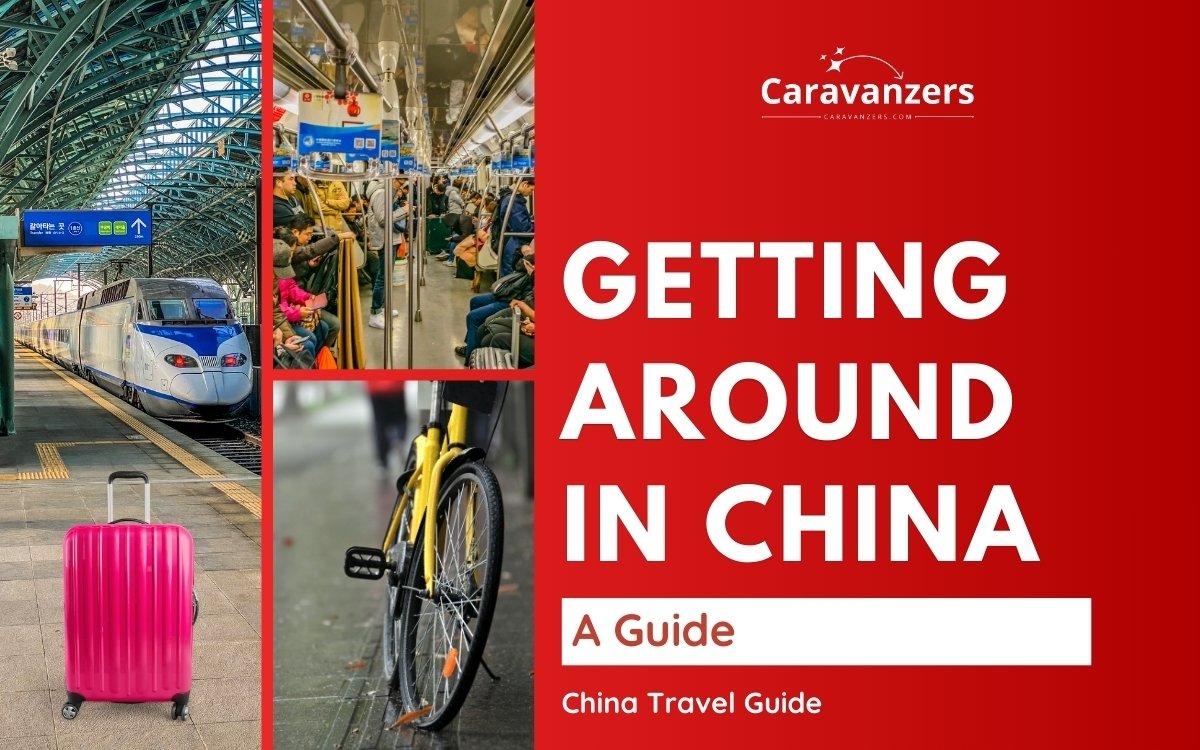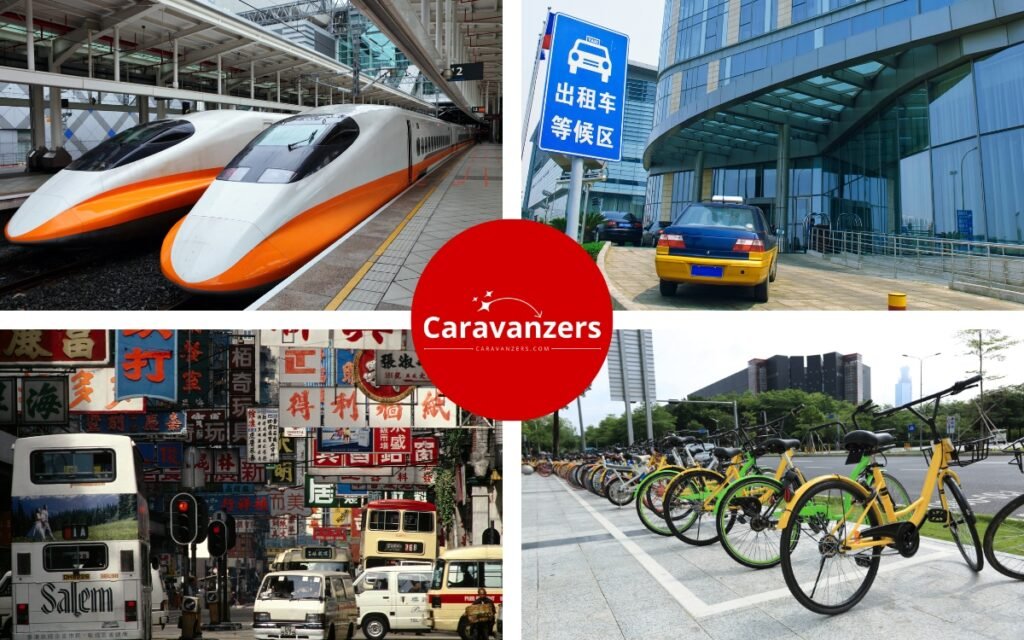
Transportation in China is not as complicated as it may sound to foreigners, and this guide has everything to know.
China travel means a chance to experience a culture that is thousans of years old, but one that is also pretty modern.
For instance, there are over 100 cities in China with populations exceeding 1 million people. Yet, there are around 300 to 400 cities in China with populations much less than that.
From mega cities like Beijing and Shanghai to smaller provincial capitals or regional hubs, China has a diverse transportation system.
If you’re visiting the country, keep reading.
Basic Info on Transportation in China

China travel destinations are diverse for transportation. Major urban centers like Beijing, Shanghai, Guangzhou, and Shenzhen lead the way in this area.
China has a diverse range of transportation modes, including high-speed trains. These are among the fastest in the world, connecting major cities across the country.
Urban areas rely heavily on buses, subways, and taxis, giving you efficient public transit systems.
Also, the extensive road network supports both private cars and ride-hailing services.
For longer distances, domestic flights are common, while freight is moved via an advanced system of highways, railways, and inland waterways.
Meanwhile, cycling and electric scooters are popular in cities, with bike-sharing programs widely available.
That is, transportation in China is an infrastructure that is continually expanding to meet growing demand.
Public Transportation in China
As you travel through the country, you will realize there are many ways to get around. Chinese travel phrases will help you a lot in this area. You will want to learn how to say a few things.
The main public transportation in China include subways, buses, and trains. Major cities like Beijing, Shanghai, and Guangzhou have extensive subway networks. These subway networks give you access to fast and convenient travel.
Buses serve both urban and rural areas, and is a great way to get around with affordable and widespread access.
China’s high-speed rail system is one of the world’s largest, connecting major cities and regions with rapid, efficient service.
Meanwhile, taxis and ride-hailing services are common for short trips. This is especially the case with cities.
In rural areas, minivans or shared taxis may be used. Although not as reliable as app-accessed networks, they are perfect in rural areas.
So, these diverse options give you flexible, cost-effective way to get around across China’s vast areas.
Private Ways to Get Around
Planning to go the Great Wall of China? You might consider access to a private car to be able to do it in your own way.
In China, the main private modes of transportation include private cars, electric bikes, and motorcycles.
Private car ownership has grown rapidly, especially in urban areas. Many people use cars for commuting or leisure travel.
Electric bikes and scooters are also extremely popular. These are an eco-friendly and affordable way to navigate crowded city streets.
Meanwhile, you should know that motorcycles, though less common in larger cities, are still widely used in rural areas.
Ride-hailing services like Didi Chuxing also give people a chance to travel privately without owning a vehicle.
These private transportation options provide flexibility and convenience for daily commuting or long-distance travel.
Apps You Must Have

If you’re traveling to China between January and March, you will definitely want to have an app to deliver some delicious Spring festival foods.
Plus, you can’t do anything without WeChat, a general app that you use for payments, bookings, etc. It’s like a mix of Apple Pay, WhatsApp, and Booking, etc.
For your trip to China, however, you will also want several key apps that are essential for getting around.
If you can, try to download them into your device prior to arriving.
Didi Chuxing is by far the dominant ride-hailing service. This is similar to Uber, giving you access to taxis, private cars, and even carpooling.
Baidu Maps and Gaode (Amap) are popular navigation apps. These apps give you real-time traffic updates, routes, and public transit directions. Expect similar function to Google Maps.
Meanwhile, there is mobike and Ofo. These are the leading bike-sharing apps, giving users a chance to rent and return bikes for short trips.
For high-speed rail travel, 12306 is the official app for booking train tickets. If you plan to go to different regions, this app is awesome. It has various payment options and real-time updates on train availability.
In major cities, MetroMan or Citymapper are perfect for subway and public transport navigation. These are necessary apps for smooth travel across urban areas.
Finally, know that the majority of the apps you bring from Western nations won’t work here in China.
VPNs for China Trip
Because your apps from home like Google Maps won’t work in China, a reliable VPN is important to bypass censorship.
ExpressVPN is a probably the top choice. It’s popular for its speed and reliability, giving you access servers that work well in China.
NordVPN is another popular provider that has robust security and obfuscated servers designed to evade the Great Firewall.
Meanwhile, Surfshark is another great option. With a user-friendly interface and strong encryption, this is probably my favorite one.
VyprVPN is specifically optimized for China, giving you access to a “Chameleon” protocol to bypass restrictions.
Finally, Astrill VPN is favored by many expats in China for its ability to maintain stable connections in restrictive environments.
What to Avoid
Your transportation in China is mostly stable and safe, but it’s important to be cautious about a few things.
First of all, you really want to avoid unlicensed taxis or ride-hailing services. If they are not booked through official apps like Didi, they may overcharge or be unsafe.
Pickpocketing may also occur in crowded areas, especially on buses, trains, or subways. This is espeically the case during rush hour, so keep valuables secure and be mindful of your surroundings.
Meanwhile, please respect local laws. Traffic rules are strictly enforced in China, and violating them will result in fines.
Also, avoid discussing sensitive political topics in public spaces, as it may attract unwanted attention or legal trouble.
Final Thoughts
Unless you want to be in the hotel room watching Ruyi’s Royal Love in the Palace all day, you will need to venture out.
The good news is that transportation in China makes it easy to go wherever you want!
So, plan ahead to avoid stress.
Enjoy China!
Li Xiu Ying is a travel writer and is the author of Beijing Travel. She writes about China for Caravanzers.
Follow us on Pinterest.
